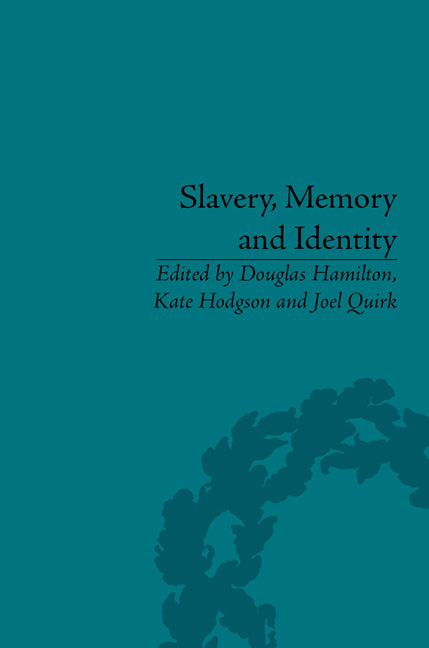Book contents
- Frontmatter
- CONTENTS
- Acknowledgements
- List of Contributors
- Introduction: Slavery, Memory and Identity: National Representations and Global Legacies
- 1 ‘A Thoroughly National Work’: The Politics of Blame and European Abolitionist Identities
- 2 From Slave Quarters to Wigwams: Native American Slaveholding and the Debate over Civilization
- 3 For Civilization's Sake: Legal Abolition of Slavery in Nepal and Sierra Leone in a Global Perspective, 1920–30
- 4 The Heritage of Slavery and Nation Building: A Comparison of South Africa and Mauritius
- 5 Picturing Slavery: The Perils and Promise of Representations of Slavery in the United States, the Bahamas and England
- 6 ‘History Must be Re-Written!’: Revisionist Ambitions among West African Slave Descendants
- 7 Contrapuntal Memories of Slavery and Abolition in the French-Speaking World
- 8 Public Memory of Slavery in Brazil
- 9 Learning to Remember and Imagine Slavery: The Pedagogies of Museum Field Trips in the Representation of ‘Difficult’ Histories
- 10 Slavery and Racism as the ‘Wrongs’ of (European) History: Reflections from a Study on Portuguese Textbooks
- Notes
- Index
4 - The Heritage of Slavery and Nation Building: A Comparison of South Africa and Mauritius
- Frontmatter
- CONTENTS
- Acknowledgements
- List of Contributors
- Introduction: Slavery, Memory and Identity: National Representations and Global Legacies
- 1 ‘A Thoroughly National Work’: The Politics of Blame and European Abolitionist Identities
- 2 From Slave Quarters to Wigwams: Native American Slaveholding and the Debate over Civilization
- 3 For Civilization's Sake: Legal Abolition of Slavery in Nepal and Sierra Leone in a Global Perspective, 1920–30
- 4 The Heritage of Slavery and Nation Building: A Comparison of South Africa and Mauritius
- 5 Picturing Slavery: The Perils and Promise of Representations of Slavery in the United States, the Bahamas and England
- 6 ‘History Must be Re-Written!’: Revisionist Ambitions among West African Slave Descendants
- 7 Contrapuntal Memories of Slavery and Abolition in the French-Speaking World
- 8 Public Memory of Slavery in Brazil
- 9 Learning to Remember and Imagine Slavery: The Pedagogies of Museum Field Trips in the Representation of ‘Difficult’ Histories
- 10 Slavery and Racism as the ‘Wrongs’ of (European) History: Reflections from a Study on Portuguese Textbooks
- Notes
- Index
Summary
The public history of slavery has been submerged for a long time in Mauritius and South Africa. In both countries it had been either denied or wilfully forgotten in virtually all spheres of life, and despite the work of a few activists, official recognition and academic research has been lacking. School books have had little to say about slaves and slavery, just as the issue was conspicuously absent from museum exhibitions and other heritage projects. Perhaps as a consequence, public discourse hardly dwelt on slavery, and even slave descendants often preferred not to be associated with slavery. The slave past, however, began slowly resurfacing in Mauritius some decades into independence and in post-Apartheid South Africa. While efforts to set the historical record straight and recognize the contribution of all South Africans to the making of the nation began with the demise of Apartheid in South Africa, remembering slavery in Mauritius occurred against the background of social and economic inequalities, which were partly interpreted as a result of the marginalization of this history and its legacy. From the late 1990s slavery started featuring in cultural productions and performances – such as school curricula, theatres, literature, heritage or commemorations. To borrow Aleida Assmann's terminology, slavery had been retrieved from the ‘storage memory’, the places of externalized memories, such as archives and libraries, which merely collect and preserve documents of a time, to become a part of the ‘function memory’, the historical canon, which a society actively remembers, consumes and performs to make sense of its past and the present.
As Gregory Ashworth and others remind us, this memory is a product of the present and its meanings and significance are constantly reinterpreted, challenged and recreated according to contemporary social, political and economic concerns. Out of a vast array of stakeholders and multiplicity of contexts, this chapter focuses on the political concerns of state agents. More specifically it explores and compares representations of slavery at state level against the background of nation building and identity politics in South Africa and Mauritius.
- Type
- Chapter
- Information
- Slavery, Memory and IdentityNational Representations and Global Legacies, pp. 63 - 76Publisher: Pickering & ChattoFirst published in: 2014



